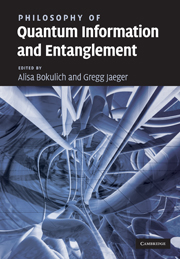Introduction
Published online by Cambridge University Press: 04 August 2010
Summary
Entanglement can be understood as an extraordinary degree of correlation between states of quantum systems – a correlation that cannot be given an explanation in terms of something like a common cause. Entanglement can occur between two or more quantum systems, and the most interesting case is when these correlations occur between systems that are space-like separated, meaning that changes made to one system are immediately correlated with changes in a distant system even though there is no time for a signal to travel between them. In this case one says that quantum entanglement leads to non-local correlations, or non-locality.
More precisely, entanglement can be defined in the following way. Consider two particles, A and B, whose (pure) states can be represented by the state vectors ψA and ψB. Instead of representing the state of each particle individually, one can represent the composite two-particle system by another wavefunction, ΨAB. If the two particles are unentangled, then the composite state is just the tensor product of the states of the components: ΨAB = ψA ⊗ ψB; the state is then said to be factorable (or separable). If the particles are entangled, however, then the state of the composite system cannot be written as such a product of a definite state for A and a definite state for B. This is how an entangled state is defined for pure states: a state is entangled if and only if it cannot be factored: ΨAB ≠ ψA ⊗ ψB.
- Type
- Chapter
- Information
- Philosophy of Quantum Information and Entanglement , pp. xiii - xxxPublisher: Cambridge University PressPrint publication year: 2010



